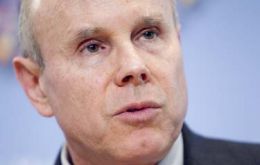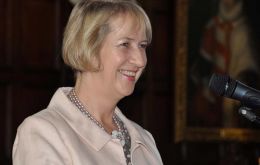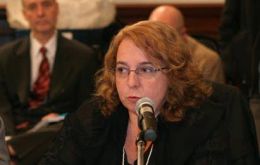MercoPress. South Atlantic News Agency
Economy
-
Friday, June 17th 2011 - 06:03 UTC
US current account deficit up 6.3% spurred by imports of more expensive oil

The US current account deficit rose 6.3% to $119.3bn in the first three months of the year, the Commerce Department has said. Strong exports of cars, computers and machinery were offset by imports, particularly of more expensive oil.
-
Thursday, June 16th 2011 - 13:26 UTC
Banco do Brasil plans to expand into Chile, Peru and Colombia

Banco do Brasil, Latin America’s biggest bank by assets, is considering buying lenders in Colombia, Peru and Chile to attract corporate clients and increase business with Brazilian companies in the region. Last month the bank announced the reopening of its branch in Montevideo, Uruguay.
-
Thursday, June 16th 2011 - 06:10 UTC
Brazil’s default risk lower than the US, claims Minister Mantega

Brazilian Finance Minister Guido Mantega said Wednesday that his country's default risk had become lower than that of the United States.
-
Wednesday, June 15th 2011 - 23:35 UTC
Argentina’s official May ‘fantasy’ inflation 0.7%; private consultants, 1.5%

Inflation in Argentina reached 0.7% in May compared to the volume reported in the previous month, the Indec national statistics bureau announced on Wednesday. The official rate is less than half what was presented on Tuesday by opposition lawmakers, which they assured reached 1.5% and 23% in the last twelve months.
-
Wednesday, June 15th 2011 - 22:46 UTC
Argentina attracted 40% of all Chinese investments in the region in last 12 months

Argentina attracted 40% of all Chinese investments in the region in the last twelve months (June 2010/May 2011) and prospects remain “optimistic” reveals a report from Deloitte.
-
Wednesday, June 15th 2011 - 19:36 UTC
Major economies, except the US, loosing recovery momentum, says OECD report

Major economies, with the exception of the United States, are losing momentum as the outlook for growth worsens in European and developing countries, the OECD's leading indicator for April showed on Wednesday.
-
Wednesday, June 15th 2011 - 19:30 UTC
Argentina industrial output up 7.9% in April and 9.2% in first four months

Argentina’s industrial output rose 7.9% on the year in April and was down 0.2% on the month, the country's manufacturers association, UIA, said in a statement. In the first four months of the year industrial output was 9.2% higher than the same period in 2010.
-
Wednesday, June 15th 2011 - 02:43 UTC
“Self determination and self sufficiency”, Falklands message to the world on Liberation Day

“Self-determination and self-sufficiency” is the Falkland Islands message to the world on the day the Islands commemorate the 29th anniversary of its liberation, said the Falklands’ government representative in London Sukey Cameron, who added Argentina continues with its campaign to claim sovereignty and disrupt the Falklands economy.
-
Wednesday, June 15th 2011 - 01:45 UTC
Argentine opposition says May inflation was 1.5% and 23.5% in last 12 months

Argentine opposition lawmakers reported Tuesday that the inflation rate reached 1.5% in May, according to the estimates provided by eight “censored” economic consultants. They added it was their duty to inform about data which “the government tries to hide from public opinion”.
-
Tuesday, June 14th 2011 - 22:31 UTC
Korean Hyundai to ensure local market agrees to export Argentine bio-diesel and soy flour

Korea’s Hyundai reached an agreement with the Argentine government by which it will compensate its 91 million US dollars surplus on sales to the local domestic market by promoting exports of peanuts, wine, bio-diesel and soy flour to the tune of 157 million US dollars.
